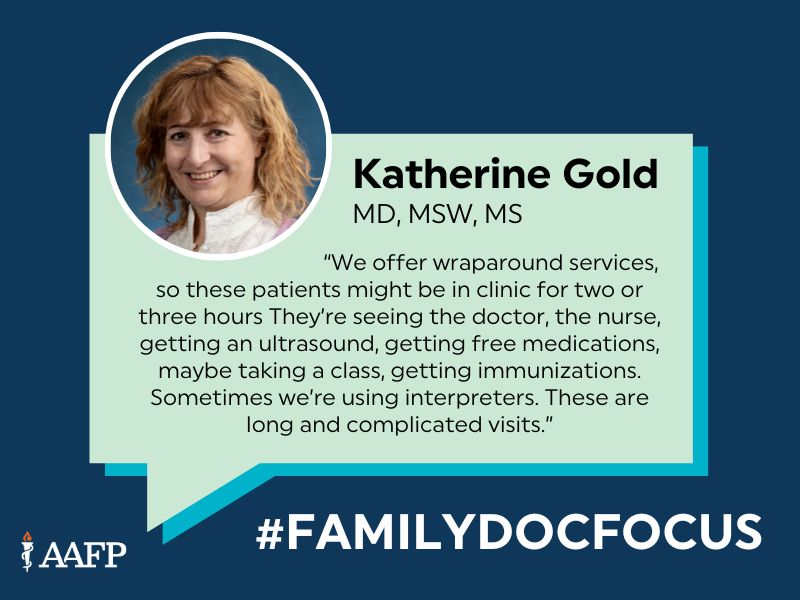Improving maternal outcomes is personal for Michigan FP
May 29, 2025, David Mitchell — Katherine Gold, MD, MSW, MS, was working as a senior policy analyst at the Environmental Protection Agency when she walked across the stage at the University of Michigan Medical School’s graduation in 2001. Gold, who was nearly nine months pregnant, was planning to take a year off before continuing her training and hadn’t settled on a medical specialty.
Her own health crisis made her path clear.
“I had some really powerful mentors in family medicine,” said Gold, who had a full-term stillbirth a few weeks after graduation. “Unlike some people, they weren’t afraid to acknowledge my loss. There were others who were like, ‘Let’s pretend nothing happened.’ That didn’t feel good to me. The family physicians were genuine people I really respected, and they are people who continue to be mentors to this day.”
More than two decades later, Gold is closing in on a career goal: 100 peer-reviewed publications. Her bibliography features a heavy emphasis on maternal and infant health topics as well as mental health.
“I wasn’t planning to study maternal health as part of my research,” said Gold, an associate professor in the University of Michigan’s Departments of Family Medicine and Obstetrics and Gynecology. “As I went through residency and a couple of research fellowships, I realized I had a lot of research questions, and I wanted to address them in a rigorous, evidence-based way.”

Gold’s additional training include work as a Robert Wood Johnson Clinical Scholar, a James C. Puffer/American Board of Family Medicine Fellow and a fellowship at the Institute of Medicine. Gold said she benefitted from “great training and great mentors.” Now she tries to pass on her passion for research to learners.
“Research is amazing,” she said. “If you think it’s boring, you haven’t been exposed in the right way. It’s all about making things interesting, relevant and passionate. I try to help people feel like they have some ownership, and I really push people to present locally or nationally. It’s a nice way to show that family docs can do a range of things. We see patients, but we can also change the way guidelines are written and the way care is provided.”
Gold is changing the way care is provided as the medical director of the Luke Clinic, which provides free prenatal and infant care in Detroit. Twice a month, the clinic takes over three floors of a church.
“We’ve got childcare,” she said. “We’ve got educational classes going on. We connect people with insurance. The Detroit Health Department comes in and does immunizations. Doulas are there to work with patients. There are breastfeeding classes, medical care, ultrasound, a pharmacy. There’s a lot going on the days that we have clinic. It’s controlled chaos.”
Roughly one-third of the women who come to the clinic are uninsured, and Gold said many have “enormous risk factors.”
“There are a lot of things we can offer that don’t fit in traditional medical care,” she said. “We are almost entirely run by family docs, and it’s a great model to have for family medicine. We have residents at every clinic, and it’s been an extremely popular rotation for medical students.”
Last year, the Luke Clinic received a $10,000 Family Medicine Cares USA grant for durable equipment and instruments. The clinic used the funds to acquire a bilirubin meter (which eliminates sending potentially jaundiced infants to the emergency room); a portable EKG machine; exam lights; models for education classes related to birth and delivery, reproductive care and contraception; and lab equipment so patients can be helped on site without delaying care.
“We’re working on spending the money,” Gold said. “It’s been a lifesaver for our clinic.”
The application period for 2025 AAFP Foundation Family Medicine Cares USA grants closes July 15.
Gold said the Luke Clinic sees about 45 patients per day.
“We offer wraparound services, so these patients might be in clinic for two or three hours,” she said. “They’re seeing the doctor, the nurse, getting an ultrasound, getting free medications, maybe taking a class, getting immunizations. Sometimes we’re using interpreters. These are long and complicated visits.”
Gold trained as a social worker before becoming a physician. She said that experience helps inform her work now.
“Only a small part of medicine is figuring out the diagnosis and treatment,” she said. “So much of it is about building relationships and knowing how to work with people when they’re angry, sad, grieving or frustrated. Social work taught me how to manage conflict. That’s not something we talked about in medical school. Social work instilled my values about caring for communities. Family medicine was the perfect place where those values fit, and I can use them every day to build relationships.”
Gold said her experience as a patient and mother also influences her work.
“I don’t normally tell patients that I had a stillbirth, but if somebody has a similar loss and it feels appropriate, I will say, ‘I understand how horrible this feels because I have been in that bed. I have been where you are.’ People have appreciated hearing that. It isn't about me. It's about their experience, but people feel like they can ask me questions they couldn’t ask someone else. I feel like there is guidance I can give people that I couldn’t give them if I hadn’t been through it myself.”
Just like the family physicians who helped her, Gold tackles difficult topics head on.
“One of the helpful things I learned is that you don’t shy away from death and dying,” she said. “It can feel horrible, but I’m not scared of it. I’ve been through it, and that’s really important when people are grieving, to have someone who’s not scared to bring it up, who doesn’t pretend like nothing happened. That’s really comforting for families.”